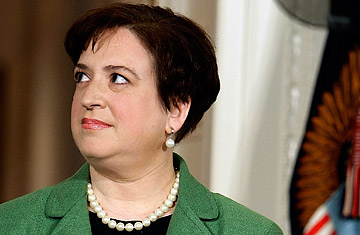
Solicitor General Elena Kagan is introduced as President Obama's Supreme Court nominee
On Wednesday, Solicitor General Elena Kagan will begin a time-honored pilgrimage across the Senate's red and yellow mosaic tiles that will last for the next month, and maybe two. As President Obama's new nominee to the Supreme Court, she'll sit through meeting after meeting during which Democrats will seek a knowing wink and a nod on issues like abortion and gay rights and Republicans will quiz her on her definitions of judicial restraint and empathy. A few baseball analogies will surely be thrown in, and she can expect some good-natured ribbing about her support for the New York Mets.
Considering what an Obama Supreme Court nominee could face in a bitterly divided Washington, the White House must surely be happy, as Kagan's confirmation process is off to a relatively sleepy start. Republicans didn't even blink at the timeline: the Administration hopes to get Kagan confirmed by Aug. 8, the last day before the Senate is scheduled to break for summer vacation, which is 85 days away. "I told the President and I told [Senate Judiciary Committee chairman Patrick] Leahy I thought that we could complete this process before the August recess," the committee's top Republican, Alabama's Jeff Sessions, told reporters on Tuesday. By contrast, when Obama nominated Sonia Sotomayor on May 26, 2009, the GOP balked at the idea of confirming her in just 74 days — though in the end, she was confirmed on schedule.
There are, of course, bound to be pitfalls. Who knows what some of her papers and speeches may yield? Thus far, Republicans (and even some liberal critics) have latched on to her lack of judicial experience: Kagan has never served as a judge, she argued her first case before the Supreme Court only last year, and she has a relatively brief academic paper trail. "I'd like to drill down a little bit on what makes her judicial philosophy," said Senator John Thune, a South Dakota Republican. "Her nomination is really sort of unusual; she doesn't have a record." On the other hand, many Senate Democrats celebrated Kagan's unusual background. "I'm one of the few nonlawyers who sit in the U.S. Senate, and I think that's a good thing," said Senator Mark Begich, an Alaska Democrat. "The more broad experience you have with the Supreme Court, the more reality you have with the people."
Also sure to come up is the issue of gay rights, given the fact that Kagan barred military recruiters from the Harvard Law School campus when she was dean over her (and the school's) opposition to the "Don't ask, don't tell" policy. "It'll be one of the issues brought up, since she appears to have been very exercised about [gay rights] generally and obviously played it out in the process of denying access to the Harvard campus by military recruiters," said Senator Jon Kyl of Arizona, the No. 2 Senate Republican. Kyl was one of seven Republicans who voted to confirm Kagan as Solicitor General. He said he believed that "the only delay" in her new confirmation would be access to Kagan's paper trail. "The timetable is really dependent on cooperation from the Administration in getting information to us," Kyl said. "I think Elena Kagan has tried to be cooperative in that regard, but I think since some of the records relate to the Clinton Administration and her two positions there [as associate White House counsel and deputy assistant to the President for domestic policy], we'll have to get approval from somebody to release those records."
Historically, the confirmation of a Supreme Court Justice is less partisan than other nominations. Senators on the other side of the aisle traditionally consider the choice a presidential privilege. "I'm going to carefully consider the President's nomination — he's entitled to that respect," said Lamar Alexander of Tennessee, the No. 3 Senate Republican and one of nine Republicans who voted to confirm Sotomayor. But in recent years, as Washington's civility has diminished, so too has respect for the process. There were titanic clashes over failed Ronald Reagan nominee Robert Bork and George H.W. Bush nominee Clarence Thomas. And Republicans still smart that then Senator Obama voted to filibuster George W. Bush's second nominee to the bench, Associate Justice Samuel Alito.
There has been nothing even close to talk of a filibuster this week in the Senate. But for all that her rollout has gone smoothly, Kagan would be lucky to garner 65 votes for her confirmation — a relatively low level of support for a Supreme Court Justice. If every Democrat votes for her — not a given — she starts with 59 votes. If she retains the support of moderate GOP Senators Susan Collins and Olympia Snowe of Maine and Richard Lugar of Indiana, all of whom who voted for her to be Solicitor General, she would be at 62 votes. (Snowe sounded cautiously positive on Tuesday, saying Kagan was "highly talented and qualified, no question. Now we have to dig a bit deeper.") But given the activist-driven, anti-incumbent wave that claimed the scalp of Republican Bob Bennett of Utah this week when he lost his party's nomination for re-election as Senator, it's not hard to envision Kyl, Utah Senator Orrin Hatch and Oklahoma Senator Tom Coburn reversing their earlier votes in Kagan's favor. Two other GOP votes are perceived to be on the fence, and the lobbying for them will surely be intense from both sides: Massachusetts' new Senator, Scott Brown, and South Carolina's Lindsey Graham (who missed the last vote on Kagan). If Kagan were to be confirmed with 65 votes, that would be substantially better than Alito — who garnered just four Democrats in a vote of 58-42 — though behind Sotomayor (68-31) and Chief Justice John Roberts (78-22), George W. Bush's first nominee to the bench. Still, given that it's an election year, any claim of bipartisan support will be a victory.
